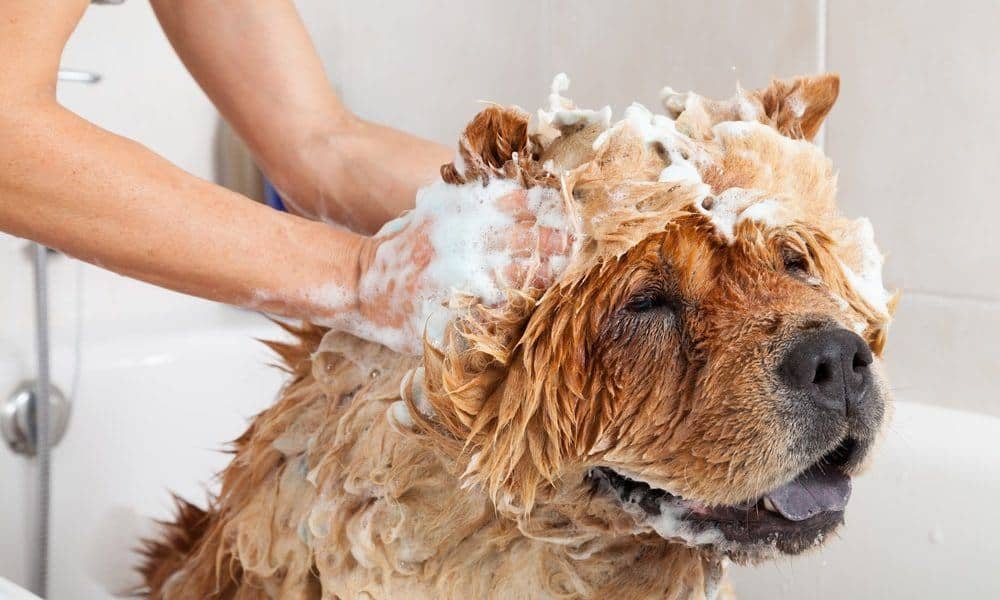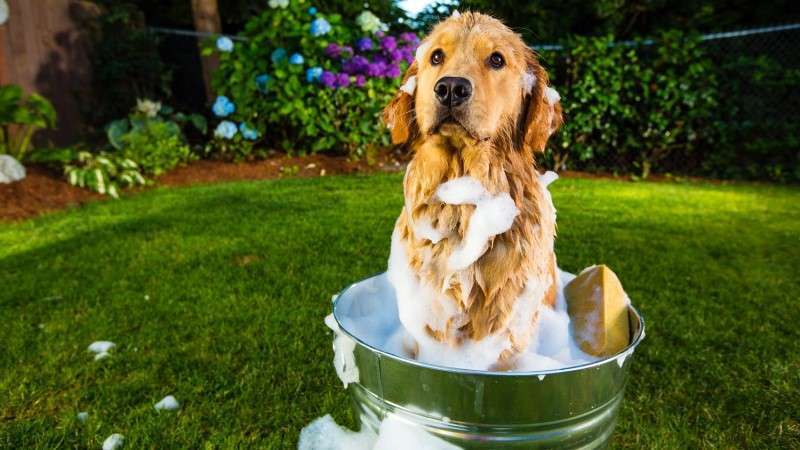If you've ever wondered why your dog smells musty after a swim, we have the answer. Swimming, while enjoyable for dogs, can lead to a distinct odor that may leave you questioning.
Key Takeaways:
- Swimming in water can cause a musty odor in dogs.
- The smell is caused by bacteria and microorganisms present in the water.
- Dogs with long or dense fur are more prone to developing a musty smell after swimming.
- Regular bathing and drying of your dog's fur can help prevent the musty odor.
- Using specialized pet shampoos and conditioners can also help eliminate the smell.
What is Swimming and Why Do Dogs Enjoy It?
Swimming: A Fun and Refreshing Activity for Dogs
Swimming is a popular activity for both humans and dogs. It involves moving through water using different strokes or paddling movements. Dogs have a natural ability to swim, thanks to their instinctive paddling motion and webbed feet.
Dogs enjoy swimming for several reasons. Firstly, it provides them with a way to cool down on hot days. Just like humans, dogs can overheat, and swimming helps regulate their body temperature. Secondly, swimming is a great form of exercise for dogs. It works out their muscles without putting too much strain on their joints, making it ideal for older dogs or those with joint problems.
In addition to the physical benefits, swimming can be mentally stimulating for dogs. The sensation of being in the water and the challenge of navigating through it can provide mental enrichment and help alleviate boredom.
Webbed Feet: An Advantage in Water
Dogs' paws are equipped with webbing between their toes, which helps them paddle efficiently in the water. This adaptation allows them to generate more propulsion as they swim, making it easier for them to move through the water compared to walking on land.
The webbing also acts as a natural paddle that helps dogs maintain balance while swimming. It spreads out when they push against the water, providing stability and preventing them from slipping or sinking.
Can Swimming Make Dogs Smell Musty?
Understanding the Connection Between Swimming and Odor
Yes, swimming can sometimes make dogs smell musty. When dogs spend time in the water, especially if it's stagnant or contains algae or bacteria, it can lead to an unpleasant odor on their fur and skin.
The musty smell often occurs due to the accumulation of bacteria or other microorganisms on the dog's coat. These microorganisms thrive in wet environments and can multiply rapidly, causing an odor. Additionally, if a dog's fur takes a long time to dry after swimming, it creates a damp environment that further promotes bacterial growth and unpleasant smells.
Factors That Influence Odor After Swimming
- The cleanliness of the water: If the water is polluted or contains high levels of bacteria or algae, it increases the likelihood of a musty smell.
- The length of time spent in the water: The longer a dog stays wet, the more time bacteria have to multiply and produce odor-causing substances.
- The dog's coat type: Certain coat types, such as thick or long coats, may take longer to dry, providing a favorable environment for odor-causing bacteria.
It's important to note that not all dogs will develop a musty smell after swimming. Some dogs naturally have better resistance to bacterial growth or may have less oily skin, which reduces the likelihood of odor formation.
How Does Water Affect a Dog's Fur and Skin?
The Effects of Water on Dogs' Fur and Skin
Water can have both positive and negative effects on a dog's fur and skin. Understanding these effects can help you take better care of your furry friend after swimming.
Positive Effects:
- Cleansing: Water helps remove dirt, debris, and allergens from a dog's fur, leaving it cleaner and fresher-looking.
- Hydration: Dogs' skin can become dry and itchy if they lack proper hydration. Swimming provides an opportunity for their skin to absorb moisture, keeping it hydrated and healthy.
Negative Effects:
- Stripping Natural Oils: Water can strip away the natural oils that keep a dog's fur and skin moisturized. This can lead to dryness, itchiness, and a dull coat.
- Bacterial Growth: As mentioned earlier, water can create a favorable environment for bacterial growth on a dog's fur and skin. This can result in odor, irritation, or even skin infections.
To mitigate the negative effects of water on a dog's fur and skin, it's important to take appropriate measures after swimming, such as drying them thoroughly and using pet-friendly shampoos or conditioners to maintain the balance of natural oils.
Reasons Why Swimming May Cause a Musty Smell in Dogs
1. Wet Fur
When dogs swim, their fur gets wet and stays damp for a longer period of time. This prolonged moisture can create an ideal environment for bacteria and fungi to thrive, leading to a musty smell.
2. Water Contaminants
Swimming in lakes, ponds, or even chlorinated pools can expose dogs to various water contaminants such as algae, bacteria, or chemicals. These substances can cling to the dog's fur and contribute to the development of an unpleasant odor.
Tips:
- Rinse your dog thoroughly with clean water after swimming to remove any residual contaminants.
- Use a dog-specific shampoo that is designed to eliminate odors and maintain the pH balance of their skin.
Do All Dogs Smell Musty After Swimming?
Not all dogs will develop a musty smell after swimming. Some breeds have naturally oilier coats that provide better protection against moisture and odor-causing bacteria. Additionally, individual factors such as overall health, diet, and grooming habits can influence whether a dog smells musty after swimming.
Tips:
- Regularly brush your dog's coat to remove dead hair and distribute natural oils that help keep their fur healthy.
- Consider using leave-in conditioners or sprays specifically formulated for dogs to keep their coat fresh between baths.
Tips to Prevent Your Dog from Smelling Musty After Swimming
1. Drying Techniques
After swimming, thoroughly dry your dog's coat using a towel or blow dryer on low heat. Pay special attention to areas where moisture tends to get trapped, such as under the ears and between the toes.
2. Grooming Practices
Regular grooming can help prevent a musty smell in dogs. Trim long fur around the ears and paws to minimize moisture retention. Additionally, regularly check and clean your dog's ears to prevent infections that can contribute to odor.
Tips:
- Use a deodorizing spray or powder specifically made for dogs to keep their coat smelling fresh.
- Consider using a waterless shampoo between baths to remove dirt and odors without the need for full bathing.
Health Concerns Associated with a Musty-Smelling Dog After Swimming
A musty smell in dogs after swimming could indicate underlying health issues that require attention. It may be a sign of skin infections, allergies, or other dermatological conditions. If the odor persists despite proper grooming and drying techniques, it is advisable to consult a veterinarian for further evaluation and treatment.
Tips:
- Regularly inspect your dog's skin for any signs of irritation, redness, or excessive scratching.
- Maintain regular veterinary check-ups to address any potential health concerns before they worsen.
Is Frequent Bathing Necessary for Dogs that Swim Often?
Frequent bathing may not be necessary for dogs that swim often if proper drying techniques are employed. Over-bathing can strip away natural oils from the dog's skin and coat, leading to dryness and potential skin problems. However, if the dog develops a persistent musty smell or visible dirt buildup, occasional baths with dog-specific shampoos can help maintain cleanliness.
Tips:
- Opt for dry shampoos or wipes designed for dogs as an alternative to frequent wet baths.
- Consult with your veterinarian about an appropriate bathing schedule based on your dog's breed, activity level, and individual needs.
Other Ways to Keep Your Dog Clean and Fresh-Smelling Besides Bathing
1. Regular Brushing
Brushing your dog's coat regularly helps remove dirt, debris, and loose hair, preventing them from accumulating and causing odor.
2. Dental Care
Maintaining good dental hygiene is essential for overall freshness. Regularly brush your dog's teeth with dog-friendly toothpaste and provide dental chews or treats to promote oral health.
Tips:
- Clean your dog's bedding regularly to prevent odors from lingering.
- Keep their living area clean by regularly removing waste and providing proper ventilation.
- Ensure your dog has access to fresh water at all times to stay hydrated and support healthy skin and coat.
| In Conclusion | |
 |
Swimming can be a fun and refreshing activity for dogs, but it's important to be aware of the potential downside - the musty smell that may follow. While swimming helps keep your dog cool and provides exercise, the combination of water, fur, and bacteria can lead to an unpleasant odor. To combat this issue, regular bathing with dog-friendly shampoos and thorough drying after each swim are essential. Additionally, keeping your dog's ears clean and dry is crucial to prevent infections caused by trapped moisture. Remember, a little extra care and attention More Reads
Dr. Clara Bennett
Hello, fellow pet enthusiasts! I'm Dr. Clara Bennett, your go-to expert on all things pets. With a background in veterinary medicine and a passion for nutrition, I've spent years diving deep into the world of cats, dogs, birds, horses, and the products that keep them thriving. From the English countryside, I've witnessed the magic of animals and am here to share my knowledge, ensuring your pets receive the best care. Together, let's master the art of pet care!
All Posts »
Next Steps In Mastering Cat CareNext Steps In Mastering Dog CareJoin Our NewsletterSubscribe to receive our latest updates in your inbox! |
















